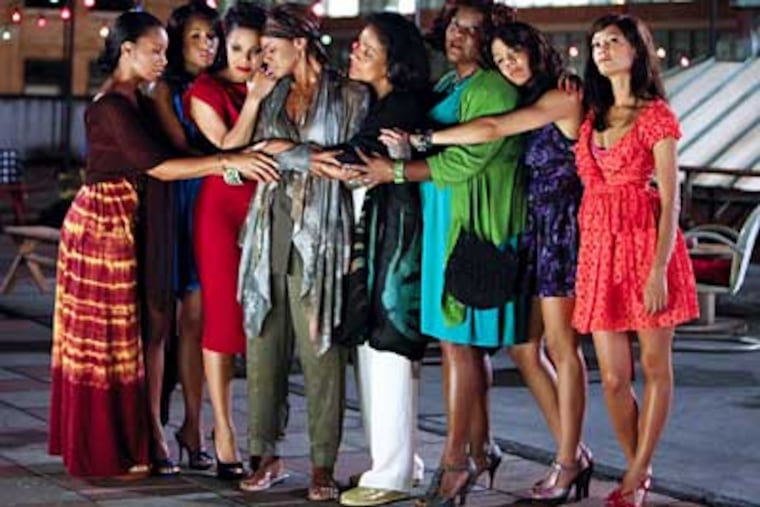'For Colored Girls': Story of women recovering from abuse
Profound performances do not a profound movie make. Case in point: Tyler Perry's all-star adaptation of Ntozake Shange's acclaimed 1975 play.

Profound performances do not a profound movie make. Case in point: Tyler Perry's all-star adaptation of Ntozake Shange's acclaimed 1975 play.
Here are some differences between Shange's theater milestone For Colored Girls Who Have Considered Suicide When the Rainbow Is Enuf and Perry's rest stop of a movie, For Colored Girls.
In Shange's play, women share their stories of having left a dangerous place for a safe one. They use poetry and movement to purge themselves of the pain, ultimately drawing lessons and support from one another. Though Perry's adaptation retains several of Shange's "choreopoems," it focuses as much on the abusive men as on the women recovering their dignity. It is one thing to hear narratives of abuse. It is entirely another to see the rapist and the rape, which turns abuse into spectacle.
At its best, Shange's work is a lyric journey through the storm to the rainbow. At its worst, Perry's movie is a relentless dance between the victimizer and his victim. Shange's poetic flow gets choked by Perry's stilted prose.
The takeaway of Shange's work is a hallelujah chorus of female self-respect; that of the dirgelike movie is "Nobody Knows the Man Troubles I've Seen, Tyler Perry Knows My Sorrow." Perry molds the source material into another variation on his theme of the good woman deceived and/or abused by her no-good, tomcattin' loverman.
Shange gives us archetypes; Perry trades in stereotypes.
For the most part, I've enjoyed Perry's seriocomic melodramas. And while I applaud him for venturing outside his comfort zone, he defaults to it here, veering from the back-alley toxicity of Precious to the penthouse sterility of The Devil Wears Prada. It could give a girl emotional whiplash.
This said, many of the individual performances in Perry's film are moving beyond words. Kimberly Elise, Thandie Newton, Phylicia Rashad, Anika Noni Rose, and Kerry Washington exalt the poetry in Shange and find the same in Perry's new dialogue. They shake you to the core. Reliable Loretta Devine dispenses laughter as a palliative for pain.
About the Kabuki theatrics of Janet Jackson and the actorly histrionics of Whoopi Goldberg and Macy Gray, the less said the better.
Shange's Everywomen are individual colors who collectively make a rainbow. Perry forces their proximity (and specificity) by situating four of them in the same Harlem tenement.
As Gilda, the building manager, Rashad stands like a great-rooted tree whose branches protect the others. To the left of her apartment lives Crystal (Elise, hollow of eye and heart), with her psychologically disturbed husband (Michael Ealy) and their two little ones. To the right lives Tangie (Newton), a promiscuous bartender engaged in serial power struggles with her pickups, reenactments of her own abuse. Downstairs lives Juanita (Devine), a nurse who counsels young women at a clinic but can't help loving that man.
Entering their lives is Kelly (Washington), a social worker with the only healthy relationship in the film, but likewise a victim of past male perfidy.
With the exceptions, the other performances are near faultless, including that of Tessa Thompson as Newton's kid sister, an aspiring dancer at the studio of Yasmine (Rose).
Applaud Perry for getting the best from most of his actresses. Boo him for not building to a climax as deeply felt as the movie's individual components. For Colored Girls is a textbook case of the whole being considerably less than the sum of its parts.
EndText